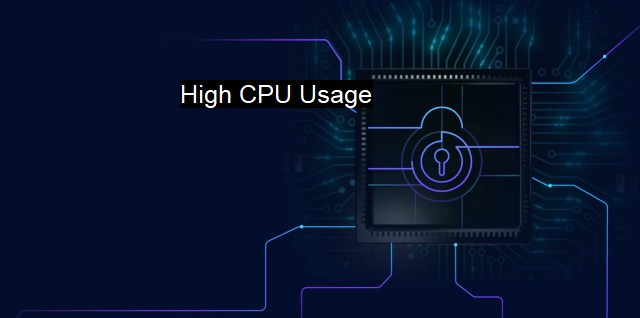What is High CPU Usage?
High CPU Usage: A Key Indicator of Potential Security Threats in Cybersecurity
High CPU usage refers to a situation where processing resources of the central processing unit (CPU) are being overutilized or strained. This happens when a computer program, a set of programs, or a system service requires more computational power than the CPU's capacity. As a result, a computer may slow down and, in some instances, may become unresponsive, stressing the CPU's capabilities beyond its normal operational thresholds.In the cybersecurity and antivirus context, high CPU usage can often be tied to underlying security threats. These threats include Malware, Spyware, Adware, or more complex forms of security threats such as ransomware and trojans. Antivirus and other security software programs aim to identify these threats in order to alleviate high CPU usage and consequent systemic issues.
Malware refers to any kind of malicious software which includes viruses, worms, and trojans. It exploits software vulnerabilities to gain unauthorized access to computing systems, causing a host of unpredictable actions, one of which involves draining the CPU resources to its maximum. Computers affected by malware may exhibit sustained high CPU usage since these strategic threats work to overwhelm a system’s processor with tasks that sustain their harmful objectives.
The same is commonly seen with spyware, a form of malware aimed at collecting information about a user or organization discreetly without their knowledge. Spyware functions by running background processes that constantly monitor, collect and transmit information. This continuous operation contributes to high CPU usage.
Ransomware, a form of malware that encrypts a victim's files demanding a ransom for their decryption, also taxes CPU resource intensively. There are instances where the ransomware not only encrypts the data but also uses the victim’s CPU resources to mine cryptocurrency, which can push the CPU usage to its peak.
From the general user perspective, antivirus software can be seen as a solution for high CPU usage. it should be noted that running antivirus software also requires processing resources. Depending on various factors such as the specific antivirus program being used, the extent of the scanning method, and the amount of data being scanned, this usage can significantly impact the system and spike the CPU usage. Even so, the slightly elevated CPU usage by an antivirus application is preferred, viewed as an investment towards bolstering crucial computer security in the larger cybersecurity landscape.
The concern should not just be fixated on the CPU usage by the antivirus program but also on what it finds during its scanning operations. A meaningful correlation often exists, showing that system resources will be significantly freed up and high CPU usage reduced once malicious software is found and deleted.
High CPU usage can signify a potential security threat that needs to be addressed. It places the impetus on strong and reliable antivirus software, which serves as a proactive countermeasure against cyber threats aiming to prey on system vulnerabilities. High CPU usage is not only a problem in terms of computer performance, but it also dominoes into broader cybersecurity consequences. Consider antiviruses and other forms of security software as robust strategies for managing CPU resource allocation, maintaining system health, and in the grand scheme of things, fortifying cybersecurity protocols.

High CPU Usage FAQs
What could be causing high CPU usage on my computer related to antivirus software?
There could be several reasons for high CPU usage related to antivirus software. It could be due to a large number of files being scanned, conflicts with other software, outdated antivirus software, or a virus or malware infection.How can I reduce high CPU usage caused by my antivirus software?
You can try reducing the frequency of scans or scheduling them for times when you are not actively using your computer. You can also try disabling any unnecessary features or settings in your antivirus software. Additionally, updating your antivirus software to the latest version may help resolve any issues causing the high CPU usage.Can high CPU usage caused by antivirus software be a security risk?
In some cases, yes. If the high CPU usage is caused by a virus or malware infection, it could potentially allow the malware to carry out malicious actions undetected. Additionally, if the high CPU usage causes your computer to slow down significantly, it could make it easier for an attacker to carry out a denial-of-service attack.Is it normal for antivirus software to use a lot of CPU?
Antivirus software typically uses some CPU resources to carry out scans and other functions. However, if the usage is consistently high and causing your computer to slow down, there may be an issue that needs to be addressed. It's a good idea to regularly monitor your CPU usage to ensure that it is not consistently high, as this could indicate a potential security risk or performance issue.| | A | | | B | | | C | | | D | | | E | | | F | | | G | | | H | | | I | | | J | | | K | | | L | | | M | |
| | N | | | O | | | P | | | Q | | | R | | | S | | | T | | | U | | | V | | | W | | | X | | | Y | | | Z | |
| | 1 | | | 2 | | | 3 | | | 4 | | | 7 | | | 8 | | |||||||